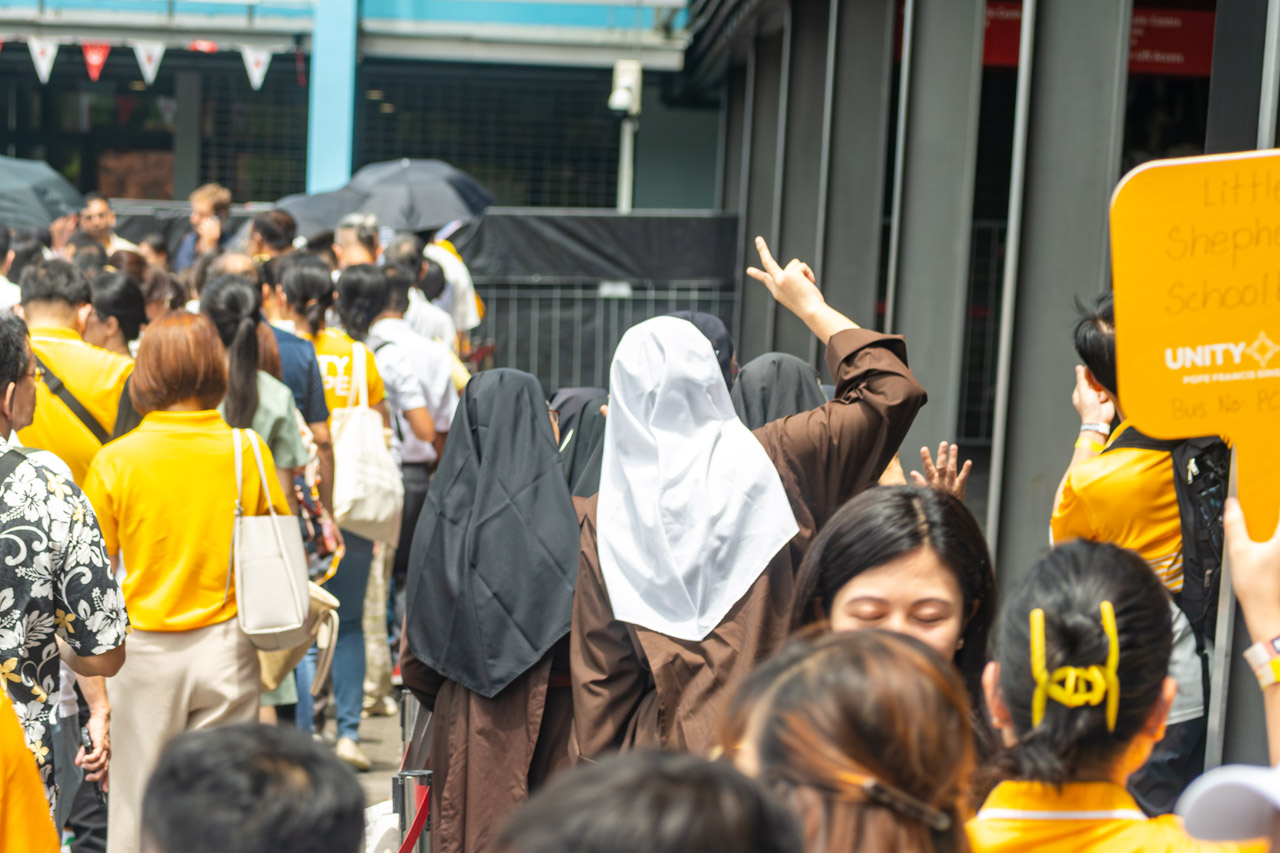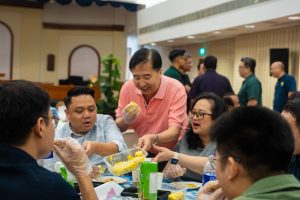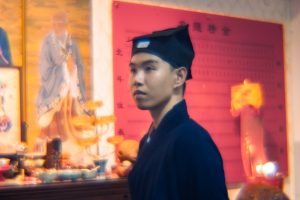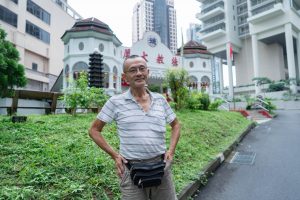All images by Nicholas Chang for RICE Media unless stated otherwise.
I met Pope Francis last week. Or, at least, I saw him in his Popemobile trundling less than 20 metres away from me.
Attending the papal mass surprised most people in my life. I was raised Catholic but stopped attending church regularly about a decade ago. If you’d told me a few months ago that I’d be packed shoulder to shoulder with 50,000 other Catholics in the same venue where Taylor Swift played ‘Love Story’, I’d have laughed in your face.
And yet, that was precisely where I found myself on September 12th.
It certainly wasn’t an accidental outing. I’d dutifully gone into my myCatholicSG account, recovered my password—that’s how long I hadn’t gone to church—and balloted for a ticket.
Seeing the Pope was one of those rare, once-in-a-lifetime moments—the kind you almost feel obligated to witness, even if just for a story. Strangely enough, despite no longer being particularly religious, I knew it was something I’d kick myself for missing.
But, if I’m being honest, I was also hoping for my own come-to-Jesus moment. Papal visits around the world have historically been events of great fanfare. Some six million believers thronged Rizal Park in Manila in 2015 to see Pope Francis.
The thing is, I wasn’t there seeking blessings or some divine miracle. I was searching for meaning. What is it about the Pope that pulls in a crowd larger than Singapore’s entire population, willing to stand in the rain just to catch a fleeting glimpse of him?
In an era where my peers and I increasingly question life’s purpose, what kind of presence does it take to resonate so deeply with that search for meaning?
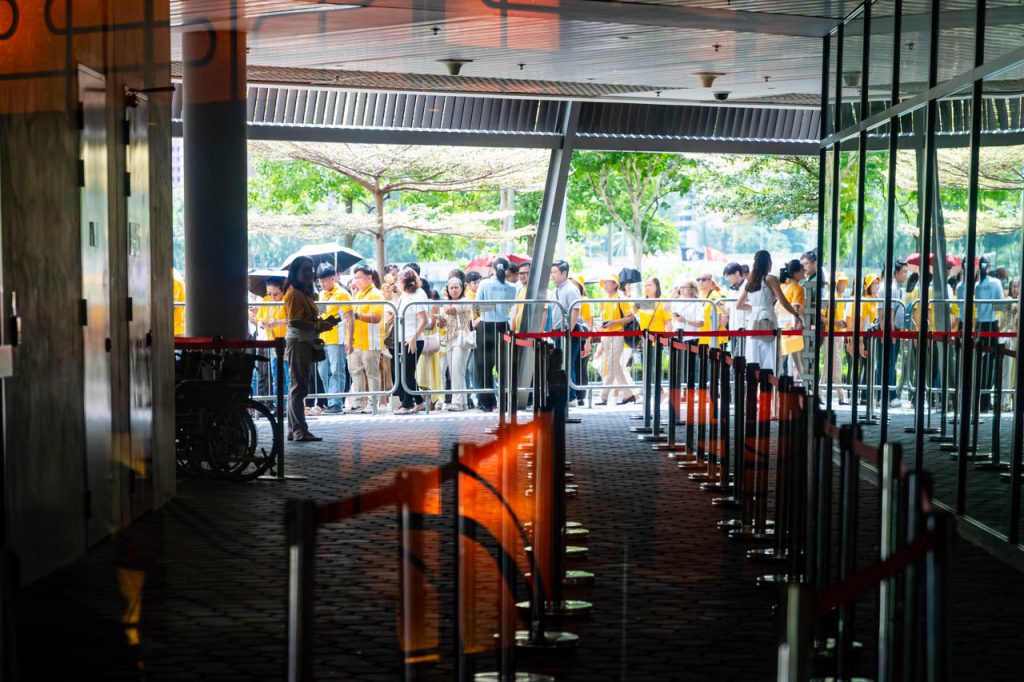
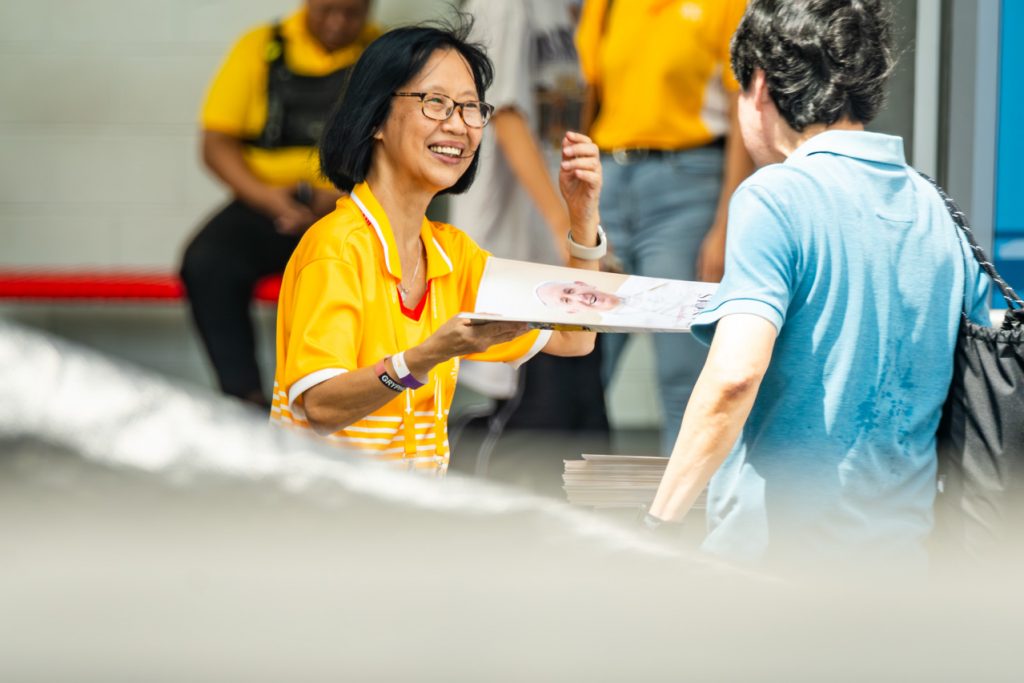
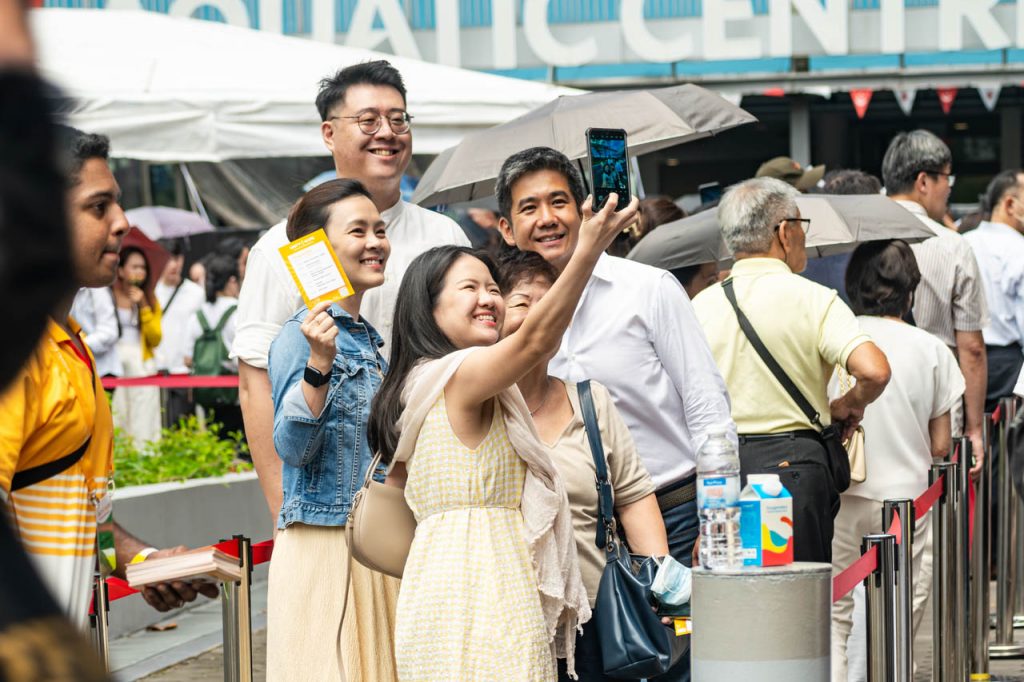
Catholic Coachella
In the lead-up to the papal mass, I’d jokingly referred to it as the ‘Pope Concert’ to my friends. After all, the pre-event buzz felt uncannily similar to the hullabaloo over The Eras Tour.
To be fair, the excitement was justified. The last time a pope graced Singapore with his presence was in 1986, way before I was born.
Tickets weren’t easy to come by, but I’d won ‘The Great War’: I scored a seat on the grandstands, just 12 rows from the front. Although I’d have to squint to see the Pope during mass, my section would see him up close during his golf cart circuit around the stadium.
One unexpected perk was the glowing approval from my very Catholic parents. I only realised my mum had bragged about it to our extended family when my aunt congratulated me on my papal mass ticket.
I’m not going to lie—the validation felt good. For just a couple of days, I was the family’s golden child because I was going to see the Pope.
The pope’s packed itinerary started circulating in WhatsApp group chats. My parents excitedly discussed waiting outside Saint Theresa’s Home on September 13th to see him. I felt a little guilty that I was the one who had secured a spot at Catholic Coachella instead of them.
The concert parallels continued at the National Stadium. Excited attendees were in their Sunday best. Some came dressed in white and yellow, the colours of the Vatican City’s flag. I spotted Vietnamese devotees in vibrant áo dài. Burmese Catholics turned up in longyi.
As the crowd waited to enter the stadium, Malaysians waved their Johor state flags jubilantly, chanting “Papa Francesco”, completely unbothered by the relentless sun.
Inside the stadium, I struck up a conversation with two Burmese attendees who told me they’d been eagerly awaiting the papal mass since they’d secured their tickets.
“I’m excited because he’s the leader of all Catholics—someone to look up to,” Eugenia, a 27-year-old migrant worker told me.
Her friend John, 28, nodded enthusiastically, adding “You can’t see God with your own eyes… but you can see the Pope.”
He articulated a feeling I’d been grappling with: that the Pope’s direct connection to God somehow made attending this mass uniquely significant. It promised to be an experience unlike any other religious service I’d been to before.
I was eager to feel something, though I didn’t quite know what yet.
Showtime
Instead of an opening act, this ‘concert’ featured a skit by the Office for Young People, which took me right back to my church camp days. (Is any church camp really complete without one of those hammy religious skits?)
The slice-of-life stage production featured a family of four trying to enjoy a peaceful evening at home. Alas, the rebellious daughter starts lashing out at her parents for favouring her brother, peppering her rant with TikTok slang like “no cap” and “low key”. Her brother also cops a scolding from their grumpy dad for wanting to spend more time on church activities.
The family on stage starts yelling at each other, and the cacophony builds until the mum yells for it all to stop. Turns out it’s her birthday, but no one remembered. She retreats to the altar, taking her woes to God. Feeling bad, the rest of the family joins her one by one. They pray for each other and make up.
The skit ends. Another fractured family healed by the power of prayer.
I’ve got nothing against the performance itself, but the storyline reminded me of why I distanced myself from religion in the first place. In my family, religion and prayer had always been presented as the answer to everything—an approach that eventually felt too simplistic for me.
If you were unsure about a decision, you prayed on it. If my parents felt that we were acting out, the remedy would be to pray the rosary together as a family. But rarely did we talk things out.
This way of life slowly started to feel unfulfilling. For me, at least. Doing anything religion-related began to feel obligatory—something I did to keep my parents happy.
For the longest time, religion, spirituality, family, and community were all tangled up in my life like a Gordian knot that was just too messy to untangle. So I grabbed the metaphorical scissors and snipped it. I stopped going to church and decided that sleeping in on Sundays was a better use of my time.
But being a part of this 50,000-strong crowd, cheering in unison as the Pope finally made his appearance, made me realise I did miss being part of a congregation. And I did miss being forced to sit without my phone for an hour each week, reflecting on life.
It almost seemed too apt that the Pope’s homily emphasised the importance of community.
“Good works may have brilliant, strong, rich and creative people behind them, [but] there are always fragile women and men, like us, for whom without love there is no life, no impetus, no reason to act, no strength to build,” Pope Francis said. The whole stadium was hushed, hanging on to his every word.
“Sometimes the greatness and grandeur of our projects can make us forget this and fool us into thinking that we can be the sole authors of our lives, of our wealth, our wellbeing, our happiness.”
Choose love over hate, solidarity over indifference, and generosity over selfishness, he adds.
As someone who’s been going through the millennial motions of life, it was a wake-up call of sorts to be more intentional. To do things out of love rather than obligation.
For a long time, I’d felt that picking up the occasional self-help book and attending the odd workout class constituted self-care. But as I turn 30 this year, I’m starting to feel like I’m craving more: Meaning, purpose, connection.
On Religion and Spirituality
That’s not to say that I’m going to suddenly return to a life of pious Catholicism. I’m probably not going to abstain from meat on Fridays or join my parents during their daily prayers.
I, like many other Millenials and Gen Zs around the world, have my misgivings about organised religion.
The proportion of Singapore residents who say they have no religious affiliation has increased from 17 percent to 20 percent, the 2020 population census found.
Of course, reality may be more complicated. I still tick the ‘Christian’ box on official forms despite not practising. Some young adults “just follow along” when their parents carry out religious rituals, but don’t see religion as a big part of their lives, reports CNA.
This isn’t unexpected, Dr Mathew Mathews, principal research fellow at the Institute of Policy Studies (IPS) tells CNA.
“People rely less on religion to provide them an explanation for the many things that happen in life but instead look to the sciences,” he explains.
“Religion as an institution is no longer playing a major role in one’s life and so fewer people will pass faith down to their children.”
Indeed, as I’ve matured, my beliefs have drifted from what I was taught in Sunday school. I don’t think sex outside of marriage is wrong, nor do I think homosexuality is a sin. And I most certainly am pro-choice.
I know that my parents probably disagree with me on all of these points. But I also know that debating them on it won’t achieve anything.
Often, outrightly disavowing religion can cause more drama than it’s worth in the family. That’s sort of why I’ve just been quiet quitting church.
At the same time, I’ve realised that quiet quitting organised religion doesn’t have to mean neglecting spirituality. Who’s to say you can’t attend a papal mass alone? Or show up at a Humanist Society gathering? Or join a Quakers Zoom meeting?
As the elderly Pope was wheeled off stage in his wheelchair by aides, it felt like the entire stadium followed him with our eyes until he disappeared from view.
He had come all the way from Rome to Asia—despite concerns about his health—to preach love, fairness, and acceptance. And even though I’m still unsure if religion is for me, that’s a message I respect deeply.
In the end, I didn’t get the come-to-Jesus moment I’d hoped for. But maybe some truths don’t need divine revelation—just a quiet afternoon spent contemplating them.

